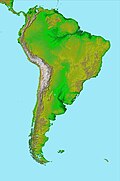Altiplano Basin

The Altiplano Basin (Template:Lang-es) is a sedimentary basin within the Andes in Bolivia and Peru. The basin is located on the Altiplano plateau between the Cordillera Occidental and the Cordillera Oriental. Over-all the basin has evolved through time in a context of horizontal shortening of Earth's crust.[1] The great thickness of the sediments of accumulated in the basin is mostly the result of the erosion of Cordillera Oriental.[2] The northern part of the basin is overridden by the Cordillera Occidental along the Pasani Fault, a thrust fault. To the east the northern part of the basin was overridden by the Cordillera Oriental along the Ayaviri Fault another thrust fault albeit the fault is now buried under more recent sediments.[1] Further south near Oruro and Sica Sica the boundary of the basin with the Cordillera Oriental block is made up by the largely buried Coniri Fault. The fault contact is not reflected in surface topography since Cordillera Oriental rises more than 10 kilometers to the east of Coniri Fault.[2]
The sedimentation rate in the basin has varied strongly over geological time. In the time from the middle Paleocene to the middle Eocene on average less than 10 meters of sediments accumulated in the basin each million year. In the Late Eocene and Oligocene, sediments accumulated in the basin at a rate of up to 500 meters per million year.[3] Similarly in the Miocene and Oligocene (15 to 30 million years ago) the Ayaviri sub-basin in the north accumulated 110 to 660 meters of sediments per million year.[1]
The basin contains three large successions of sediments. From bottom to top these are:[3]
- Maastrichtian–Paleocene aged marine and non-marine sediments of the Santa Lucía and El Molino formations. Their thickness is about 250 to 900 meters.
- The 3000 to 6500 meters thick non-marine Potoco Formation. Most of the formation is of Eocene–Oligocene age.
- Sedimentary and volcanic rocks of Oligocene to Quaternary age making of a 1000 to 4000 meters thick pile.
References
- ^ a b c Perez, Nicholas D.; Horton, Brian K. (2014). "Oligocene-Miocene deformational and depositional history of the Andean hinterland basin in the northern Altiplano plateau, southern Peru". Tectonics. 33: 1819–1847. doi:10.1002/2014TC003647.
- ^ a b Herail, Gérard; Baby, Patrice; Soler, Pierre (1994). "El contacto Cordillera Oriental-Altiplano en Bolivia: Evolución tectónica, sedimentaria y geomorfológiaca durante el Mioceno" (PDF). 7° Congreso Geológico Chileno (in Spanish). Vol. Actas Volumen I. Concepción, Chile: Universidad de Concepción. pp. 62–66.
- ^ a b Horton, B.K.; Hampton, B.A.; Waanders, G.L. (2001). "Paleogene synorogenic sedimentation in the Altiplano plateau and implications for initial mountain building in the central Andes". GSA Bulletin. 113 (11): 1387–1400. doi:10.1130/0016-7606(2001)113<1387:pssita>2.0.co;2.
{{cite journal}}:|access-date=requires|url=(help)

